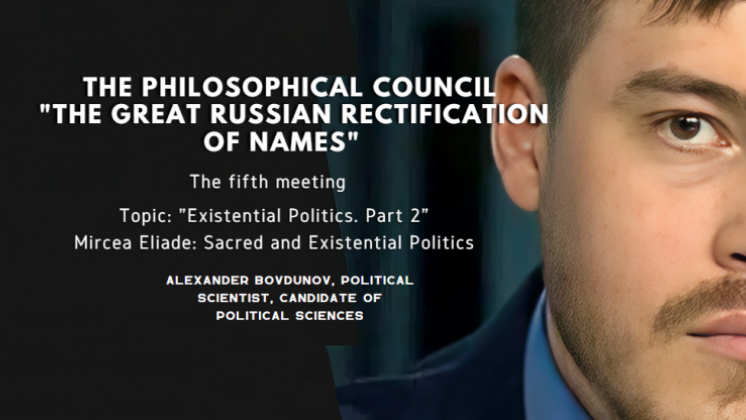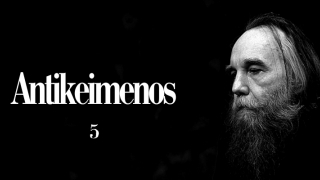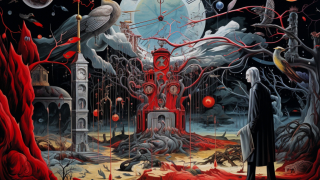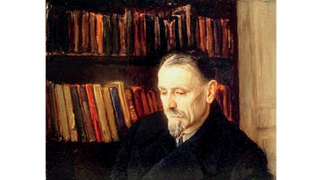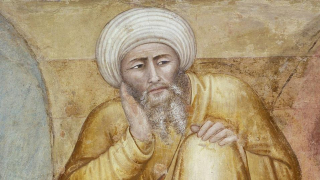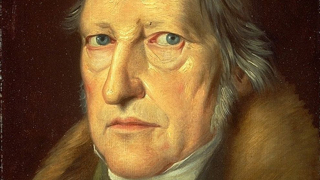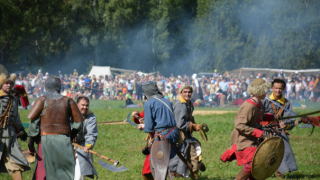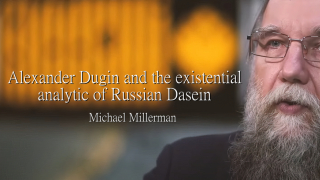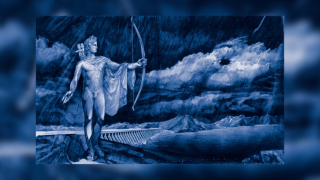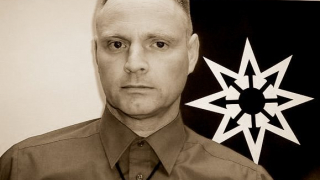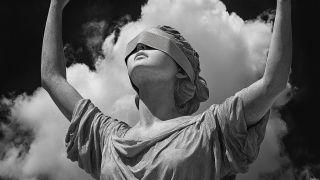Mircea Eliade: Sacred and Existential Politics
The Philosophical Council "The Great Russian Rectification of Names". The fifth meeting.
Topic: "Existential Politics. Part 2"
Mircea Eliade: Sacred and Existential Politics
Alexander Bovdunov, Political Scientist, Candidate of Political Sciences
Preparing this report... In fact, it was Dasha (Daria Dugina) who had invited me to come and get involved in the Council. She suggested that I talk about Luciano Blaga, because Alexander Dugin had talked about him in the context of the Fourth Way and existential politics. But I decided to make a report on Eliade, although for some reason it seemed unexpected and fortunately is in the context of the topic brought up by Nikita Syundyukov. And it seems to me now that the report and the subject it deals with have become, to put it immodestly, somewhat practical, but for some reason it has also dealt with these subjects: sacrifice, Easter, somehow, history... So let's get down to the report itself. I assume Daria is supposed to be mentioned at the end of the report without any special dedications to her at the beginning, since it turned out that the entire report was actually dedicated to her.
On the basis of Nikita Syundyukov's theses, I would like to begin with this point: when we speak of Petr Chaadaev, we retain the idea that he is a Shelingian, and he criticises Russia for the absence of history in the Shelingian sense. In other words, history is a kind of participation in the worldwide process of the development of divine thought about the world and man, and as far as Chaadaev is concerned, Western history is seen as such a development, but Russian history is not. But in fact this is a basic model common to Heidegger as well, since we are talking about existential politics. Die Geschichte des Seyns with its history of being and historials is actually quite the same.
But the problem, as Chaadaev puts it, is that the Russian people haven't spoken up in history, or haven't spoken up yet. And Chaadaev, as a Schellingian and a historicist, initially interprets this absence of speech as a dream of negation, in other words as absence itself. But silence can be quite intense. If we look at the problem from the point of view of silence itself, it hardly sees itself as anything. This is also an abyss, not an abyss of emptiness, but a sufficiently saturated abyss. Generally, there are three possible attitudes to the problem that appeared with Russian thought:
- The first one is a Western-inspired approach. We interpret this silence as the absence of language in general and the absence per se, which means that the Russians must be taught to speak the language of European modernity and be properly introduced to history, i.e. to European history - to the history of the world.
- The second, the Slavophile way, relatively speaking, is to explain that what is interpreted as silence is in fact a language, but not understood, suppressed by the bearers of the Western modernist paradigm. The Russians had their own history, the history of Byzantium, the third Rome. But after Peter the Great we were forced to forget this language and live the history of others. The conclusion is that we have to go back to the old way, to the Byzantine language, to the patristic heritage, and by appealing to this heritage we have to start a new enlightenment, or something like that.
- The third approach, which can be reconstructed in part, refers to Slavophiles, to some narodniks, to the Silver Age, and, finally, to Alexander Dugin in the last volume of the trilogy, when he speaks of the Kingdom of Earth, or of the Russian Logos in his series of books Noomachy. We have to go even deeper than the representatives of the second point of view, to understand that the language of the Byzantine Church State is the language of the Russian elites, the language of their history, and that the people before Peter the Great were silent or spoke, but not in their own language. And Russian history has not yet been read, and can only be read now; it is the history of the future. And the conclusion, if we take Heidegger's terms, is in fact the one that was discussed at the previous meeting, when Alexander Dugin spoke about the need to derive a full-fledged ontology from this folk ontics.
What does Mircea Eliade have to do with it at all? We Russians like to think of ourselves as very unique, but in fact we are not. Incidentally, quoting Gachev also refutes it regarding Bulgaria. But what I'm saying is that we need to overcome Russian solipsism and at least understand that this very problem has also been recognized in another Orthodox country with a developed Europeanised culture, namely Romania. If we divide the most influential Romanian 20th-century writers into three categories, we get the same picture:
- The first group was in fact in agreement with Chaadaev's point of view. Emil Cioran is a shining example of this, with his sharp concern about the lack of a historical mission. His conclusion was that the revival and transformation of the people is only possible through the rejection of orthodoxy, mysticism and contemplation. It is such a leap into the future, out of the tragic existence of emptiness and disappointment. The failure of this project: absolute despair and physical, mental and linguistic emigration, is in fact the fate of Cioran himself.
- The second group were the proponents of Orthodoxism or Gandurism. This is the idea of Romania as a second Byzantium, as the sole heir of Byzantium after the collapse of the Russian Empire. Only Plato, only Dionysius the Areopagite, only St Maximus the Confessor, only Orthodox mysticism - on this we build everything - philosophy, ideology, politics.
- The third group is the most interesting. It was represented by Nae Ionescu, Lucian Blaga and Mircea Eliade, to name but a few. For example, Blaga, who had a very serious influence on Eliade, had authored a paper "Metaphysical Dream". This is an appendix to the Cosmological Trilogy, the last part of his philosophical corpus, in which, like Chaadaev, he raises the question of the Romanians' lack of history and tradition in the Western sense as a potential inherent in the people.
However, Blaga points out that people don't live in history, especially not his people, because they live in eternity. And what Chaadaev sees as such a dim, meaningless, powerless, energyless existence, Blaga interprets as a magical traditionalism based on participation in eternity, which is higher than any time. And there are the logical statements of Blaga, which echo the remarks of Nikita Syundyukov, i.e. the statements about Romania, which has not implemented anything. Everything is possible, and nothing can be said as beautifully as possibilities. Orthodoxy as an onto-historical orientation to eternity is in this context not a setback in historical development, but a salvation from pseudo-history, i.e. from living the history of the others. And the way out offered by Blaga is not solidarity with the problematic past. To be precise, it does not exist as experienced and understood. Neither it is a kind of nihilism, as an attempt to build a philosophy on groundlessness, on negativity, but a traditionalism turned towards the future, as a solidarity of magic with something we have in our latent state.
In fact, Blaga influenced Eliade a great deal over a period of time. And in this context, both Blaga's and his friend, a follower of the autochthonisation of philosophy, Vasile Brecile's philosophy, and the formation of a new philosophical language based on the study of the peasant way of thinking, in fact all of Eliade's affection for small primitive peoples and peasants can now be understood. The affection for the Southeast European peasant world view, the cosmic peasantry and eternal return, and so on and so forth. But it is impossible to fully understand Eliade's attitude to history without understanding that he is a phenomenologist and a deep admirer of Heidegger. And indeed, one of the underpinnings of his philosophy is a kind of existentialism. In fact, the main similarity between Eliade and Heidegger is their attempts to build their systems on the confrontation with man's pre-conceptual presence in the world, rather than on some prescribed or externally imposed normative metaphysical statements. This is why, for example, Eliade, borrowing from Otto and the tradition of religious studies, bagan to talk about the Sacred and its phenomenological character. If we sum up all the definitions he gives to the Sacred, it turns out to be the inner part of human consciousness that makes a person human. At the same time, it's an experience of encountering a complete Other that stays in the consciousness and at the same time shapes a person as an integral, distinguishing being and the world as a cosmos, manifesting itself as a kind of baseline, a charge. When experiencing the Sacred, a kind of cosmic hierarchy is built up from the scattered impressions of the senses. Modern followers of Eliade, such as Brian Rennie, try to understand the sacred as a kind of energy object. But we can interpret it as the source of subjectivity, and then it is something like Brentano's phenomenology, Aristotle's active intelligence or Husserl's transcendental subjectivity.
In this case, the existential politics of the sacred is possible as a world-transforming movement towards this center of the sacred, understood as the source of the existential. In 1930s, Eliade introduced two concepts: the history that is made and the history that is consumed. The first history is the direct participation of the people in the historical events at the decisive moments that concern the whole of the human being. This is the history that suddenly breaks out, as if out of nowhere. And the second is an alienated history that presses on a person with the social and political structure of everyday life. This is, in fact, Heidegger's Altagsligkeit, interpreted as a constant accumulation of these structures of alienation that put pressure on a person and deprive him of any freedom of choice: everything is already closed to you, you live in these structures and you can't interfere or change anything, the further, the more. At the same time, Eliade deals with the theme of sacrifice, both in literature and in scientific research, in the comments and introduction to "Master Manola". In his political articles, he also draws attention to an aspect of sacrifice and willingness to sacrifice - to overcoming politics as an alienated space of compromise of social technologies. To the fact, that the focus of a sacrifice is not on the seizure of power, but on the creation of a new person, the resurrection of nations and, well, it is clear what he means. At the same time, however, we must understand that he would later criticise the legionary movement, with which he once sympathised, for being unable to sustain itself at this level of sacrifice. For the fact that the victims became the executioners in that moment, and the expected transformation did not take place - it drowned in the blood of vengeance.
Here it is important to focus on martyring and sacrificing as the main content of political action. What does it mean? It means a readiness to come into contact with the experience of death, an extreme anti-utilitarianism and, at the same time, an orientation towards the sacred, a direct orientation towards the soteriological. It is not an expression of the will of power, which, according to Heidegger, was the main tool for designing classical metaphysics and ontology, based on the inauthentic existentialism of Dasein. It is also absolute freedom from all restrictions, because nothing can really restrict or frighten a martyr or a person who has voluntarily agreed to martyrdom. And at the same time, it's the pairing of two orientations, usually divided, that Eliade and his teacher Nae Ionesco used to call soteria or sympathy. Soteria is an orientation towards the exit of the world into society, a fusion with the divine, such an individualistic realisation as magical idealism. And sympathy is immersion and love for people, for a nation, historical solidarity. That is to say, liberation from history, consumed by the act of sacrifice, transforms man into an active agent of history, which he actually makes and which becomes for him the history of his nation.
And this paradigm of sacrifice, the desire not to take but to give everything, to the point of giving oneself, is manifesting itself right now, during the special military operation. This means that, in general, people will go almost anywhere without expecting anything in return, without any commercial considerations at all. That is why we can understand the military men of special military operations as the source of a new spiritual elite, truly free and ready to create Russian history, to make history themselves, their own history, and not to consume the history of others. And Daria Dugina was this kind of person. If we comprehend our special military operation, our war against the West in Ukraine, with all its mistakes and tragedies, we can understand Daria's assassination not only as a tragedy, but also as a celebration of her as a warrior, as the highest point in the realisation of the goal, as the achievement of such attention to herself. But we can also see it as a chance for the emergence of an elite capable of carrying out the task of building a Russian ontology on the basis of Russian ontics.
And at the same time, with such an appeal to history, we can see another approach to sacred politics by Eliade. It is the preservation or re-creation of peasant communities, at the centre of whose existence there is also something sacred. Something, in fact, that Uchan Blaga has described in a very beautiful way. He was talking about the traditional structure of a traditional village: at its centre, both geographically and in terms of consciousness, is God and their dead relatives. Eliade is often accused of anti-historicism, especially in relation to the myth of eternal return. But we should bear in mind, firstly, that there is no anti-historicism there and, secondly, that it should be seen in the context of the theory of history that is being made and the history that is being consumed as a rejection of meaningless history - history that is consumed, secularised history, history as an accumulation of mistakes, alienated structures that deprive a person of freedom. The biggest mistake, therefore, is to see Eliade's "eternal return" as a mere circular movement, as the eternal return of the same Nietzschean, or as a manifestation of Heidegger's meaningless, inauthentic existence of everyday life. Eliade's "eternal return" is the possibility of always returning to the centre from any point of this circle, a return to the original time, to the root sacredness, a way out of the daily routine, where one can correct the mistakes of history and exist in a mode of celebration and joy.
And here we are moving on to the original function of the sacred celebration, because the main function of the celebration is actually this eternal return, an appeal to the source of the sacred, as to the source of the existential. As Vasile Brencile, one of the philosophers of the same group of the 20s and 30s, noted, people traditionally exist more intensely and authentically during celebrations, truly sacred celebrations. They are the most beautiful, the least utilitarian, they are not caught up in the structures of everyday life, they have a real spiritual experience and freedom in this moment of celebration. And this convivial dimension of the ontic and sacrificial orientation of the elite, which builds ontology and creates history, has an important symbolic contact in our Orthodox context, such as a cross. This is, of course, Easter, participation in the sacrifice and passion of Christ, the joy of the resurrection and the victory over death, the union of history and eternity. A cross-shaped intersection of vertical kinetic condescension, of the highest possible martyrdom, of the God who became man, and at the same time horizontal remembrance of the ancestors, the dead, whose veneration is also directly adjacent to Easter in the calendar circle. The Victory Day (9 May) is also considered to be an Easter-like celebration, one of the most important celebrations for us. But we can also note that a formal external defeat, understood as a spiritual victory, can also be interpreted in the same way and in the same spirit. One example is how Kosovo is interpreted in Serbian theology and philosophy. And if we understand a special military operation as a common cause, as a nationwide battle against the Antichrist, then it gives us the chance to experience exactly this Easter dimension of freedom in sacrifice and resurrection with Christ and for Christ's sake and together with our heroes and martyrs and with Daria and with hundreds of other heroes of this war. The chance to experience it not just in a ritual, not just as something that happened once or indirectly, but right here and now, to come into contact with this rather painful but probably necessary experience for us.
Translated by Alena Mokicheva

